Album reviews: Wilco; Andrew Schultz; Infamous Stringdusters; Bruce Hornsby; Dinosaur
With any new Wilco album there’s a sense of foreboding that comes attached.
ROCK
Schmilco
Wilco
Anti-/Warner
4 stars
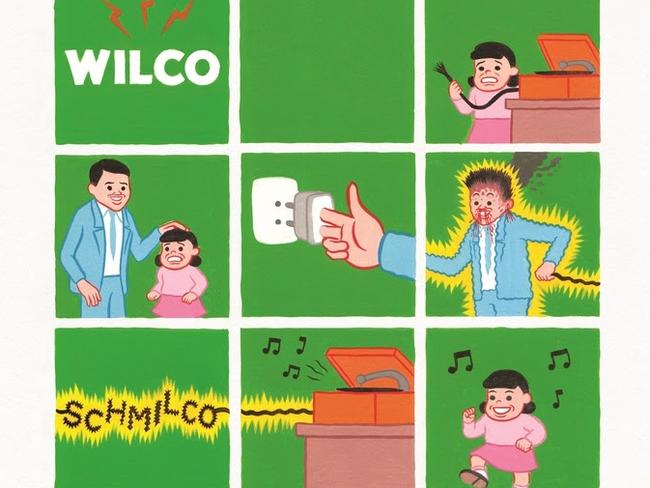
With any new Wilco album — and they seem to come out of thin air these days — there’s a sense of foreboding that comes attached. Which Wilco will it be? Songwriter Jeff Tweedy has led the Chicago ensemble through a number of guises over the past 20 years or so, beginning with the alt country that was the mainstay of his previous outfit Uncle Tupelo and then weaving a path through melancholy folk, psychedelic rock and all points in between. Last year’s excellent giveaway collection Star Wars was a rewarding hybrid of the six-piece outfit’s experimental tendencies, 1970s glam-rock and their Americana foundations.
Here, in a 36-minute, 12-song burst, Wilco is immersed largely in the latter form, while giving the occasional nod to John Lennon. Tweedy sets out his store on the opening Normal American Kids, a stark acoustic reflection on childhood isolation. “Hiding behind the garden shed / painting myself as a normal American kid,” he sings in almost nursery rhyme fashion. Recorded in the band’s Chicago studio, there’s a warm, loose-limbed feel to Schmilco, a title inspired partly by American songwriter Harry Nilsson’s Nilsson Schmilsson album. The ghost of Nilsson’s buddy Lennon hovers over a couple of tracks here, most acutely on the stripped-back ballad Happiness, more aggressively on the angular, upbeat Locator and most engagingly on the country-blues stomp of Nope, which could easily be a Fabs jam left off The White Album.
The band’s penchant for building tension through a cacophony of intertwining riffs and synth drones and blasts is explored rarely. On Common Sense, one of the three tracks that break from a traditional country-roots format, two dissonant electric guitar motifs battle it out to the death under Tweedy’s disturbing vocal. Drummer Glenn Kotche adds his inventive yet subtle touches, mainly on brushes, to the gently driving country picking of Quarters and to Cry All Day, on which Tweedy sings of vulnerability: “Something like me you don’t want to be / I cry all night, I cry all day.”
We’re six songs in before the comfort of this alt country/pop melange is given a good shake. Someone to Lose starts in that fashion, but takes an unexpected and delightful turn when guitarist Nels Cline’s strident riff rides over it. In this and in the easy cohesion elsewhere we have a band enjoying the chemistry that has developed between them in the 12 years that this line-up has been together. The album tapers off towards the end with a couple of songs that are no more than Wilco by numbers, Shrug and Destroy and We Aren’t the World (Safety Girl), but the closer, Just Say Goodbye, is Tweedy at his melancholy best, howling at the moon over Kotche’s intricate snare rumble. Schmilco might not appeal to fans of Wilco’s more esoteric explorations, but it’s a fine reminder of where they came from, before the bombast, synth noodling and intense grooves entered the picture.
Iain Shedden
*
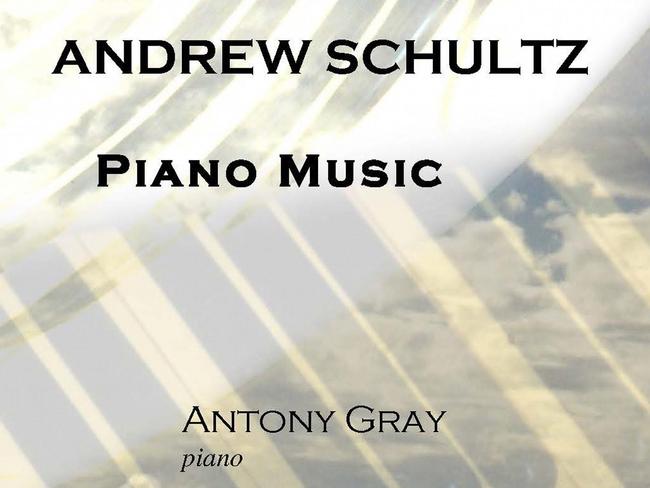
CLASSICAL
Andrew Schultz Piano Music
Antony Gray
Wirripang
4 stars
These 15 pieces composed between 1987 and late last year comprise 72 minutes of solo piano music by someone who doesn’t think of himself as a pianist or piano composer. Andrew Schultz’s principal instrument was the clarinet. His aural compass traces the unruly terrain of his native Australia, the orderly grids of Europe and the majestic peaks of the Canadian Rockies. There are moments of exquisite stillness, drops of water dripping from ice, alongside ruminative flurries from baroque organ lofts. The listener senses a singular voice, one that values clarity over density. Listeners who recall the extraordinary oratorio Journey to Horseshoe Bend (2002) will welcome the piano extract Sleepers Wake — Karalananga, with its improbable but effective blend of a Bach chorale and indigenous chant. Also welcome is the third recording of the Barcarolle (1992) and the Sea-Change (1987). As he has done with neglected composers Goossens, Williamson and John Carmichael, Australian expatriate pianist Antony Gray has captured the essence of Schultz’s well-ordered and considered music. Just once or twice the ear hankers for a Britten-like cloudburst. As head of the school of media and performing arts at UNSW, Schultz is an eloquent commentator on music, but the liner notes here would have been enhanced by commentary from another voice, perhaps from Gray or pianists such as Stephen Emmerson or Bernard Lanskey, for whom Schultz has written works for piano four-hands, well documented on several recordings from Tall Poppies.
Vincent Plush
*
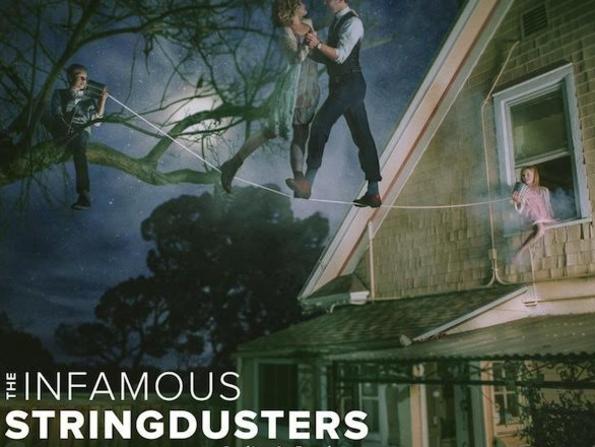
ROOTS
Ladies and Gentlemen
Infamous Stringdusters
Compass/Planet
4 stars
Take a band with immaculate acoustic chops, add 12 impeccably crafted new songs and a Grammy award-winning producer, and mix ‘n’ match with an impressively credentialled cast of female roots singers and you have, on paper, an irresistible combination. The Infamous Stringdusters’ sixth studio album does indeed bring home the bacon. From the beefy pop hooks and meaty chorus of opener Listen (“listen to the wind blow, listen to the rain fall / listen to the dark clouds, listen to your heart call”) — dynamically delivered by Joan Osborne — to a closing instrumental thriller, Hazosphere, featuring the trumpet of Jennifer Hartswick, there’s nary a dull moment on Ladies and Gentlemen.
An enticingly eclectic set also includes a suitably soulful song sung by Joss Stone (Have a Little Faith), a country number (I Believe) featuring Lee Ann Womack, and a couple of philosophical pieces, Won’t Be Long and See How Far You’ve Come, rendered closer to the Stringdusters’ and respective vocalists’ roots by bluegrass’s blue-eyed belles Sarah Jarosz and Sara Watkins. Contrary to its title, Rock and Roll — served up with charm by Abigail Washburn — combines folk and a dash of Dixieland jazz. Equally expressive performances by Celia Woodsmith and Aoife O’Donovan imbue Old Whiskey Bottle and Run to Heaven with requisite smoky blues and pathos. Chris Goldsmith’s production is consummate, but the real visionaries here are the Infamous Stringdusters, who wrote and arranged the songs specifically for this project, and underline their skill with superb backing tracks, on dobro, guitar, banjo, fiddle, upright bass and harmony vocals where required.
Tony Hillier
*
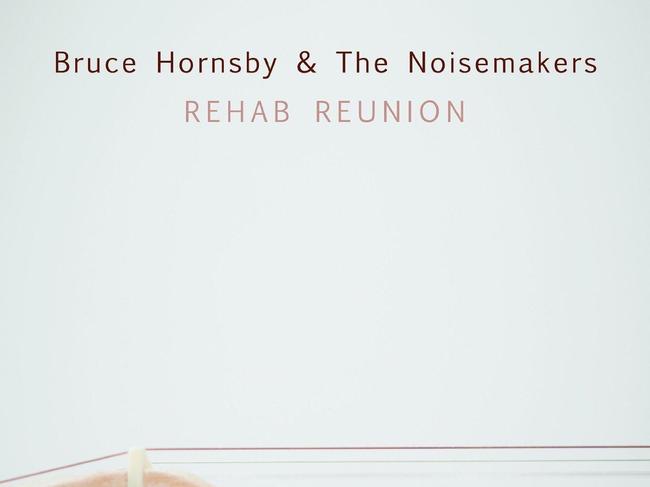
ROCK
Rehab Reunion
Bruce Hornsby and the Noisemakers
UMA
3.5 stars
Jimi Hendrix turns to saxophone solos, Miles Davis tries out the accordion and Billy Joel wants to release an album of instrumentals. They’re all seemingly absurd propositions — but not far removed from Bruce Hornsby stepping away from the piano to release 10 tracks on which he plays the lap dulcimer. Hornsby has been including a dulcimer section in his concerts for about seven years, but it’s still a courageous move. In 2002, Hornsby tried an album practically devoid of piano, Big Swing Face, and his fans revolted. The first track of the next album, Gonna Be Some Changes Made, spoke volumes. Hornsby often jokes during his concerts about his dulcimer ability — or lack thereof — so on Rehab Reunion, without the virtuosity of his piano playing, his lyrics come to the fore. Like many of his recent albums, this one is replete with his quirky, often tongue-in-cheek takes on a wide spectrum of life: from an ode to Czech writer Franz Kafka (“In the daylight he wrote for his insurance firm, in the darkness his prose made his audience squirm”) to tipping (“Five or 10 per cent’s too cheap, even 20 per cent’s too steep, don’t know how to get to 15 per cent, it should be on the receipt”) and alcoholism rehabilitation (“I’d get more to drink at a holy communion, this evening of bliss has a sober conclusion”).
Rehab Reunion arguably reaches its high point at the end with an acoustic reworking of Valley Road, one of Hornsby’s early favourites, and Celestial Railroad, a joyous duet with the dusty-voiced Mavis Staples. But, ultimately it feels like a fun diversion from what Hornsby does best.
David Tanner
*
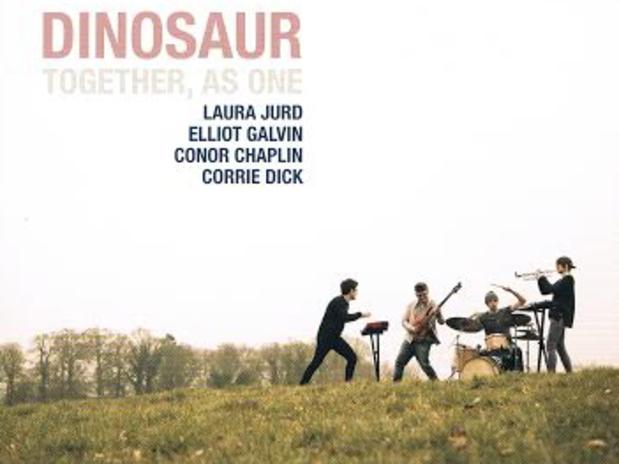
JAZZ
Together as One
Dinosaur
Edition
4 stars
This third album with British award-winning trumpeter Laura Jurd as leader features three of her regular collaborators: Elliot Galvin on Fender Rhodes and Hammond organ, Conor Chaplin on electric bass and Corrie Dick on drums. Jurd has enjoyed a meteoric rise since she first appeared on London’s creative scene in 2010. She has worked with this band — newly named Dinosaur — for six years, playing in Britain and Europe. Switching seamlessly between synth and trumpet, Jurd leads the band through eight sometimes playful, always interesting originals. Opening with a fade-up intro to Awakening, a bass riff establishes and continues as trumpet and fender produce an abstract theme ahead of Jurd’s authoritative solo. Four tracks on we have Steadily Sinking, a short piece of 1½ minutes, with a stately start of chord clusters. Primordial begins with distorted Hammond chords and lead trumpet, moving from balladic to declamatory phrases that build climactically, assisted by Hammond and drums as the piece develops into wild organ excursions. The insistent rhythm of the finale, Interlude, conveys an impending feeling as the trumpet roams with melodic freedom and percussive effects develop. Most of the solo work is carried by Jurd’s inventive, expressively mobile trumpet and the general ensemble components are imaginatively arranged, all contributing to a lively and productive album of originals from this high-level British group.
John McBeath



To join the conversation, please log in. Don't have an account? Register
Join the conversation, you are commenting as Logout